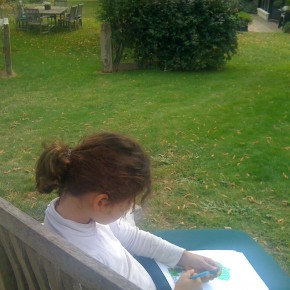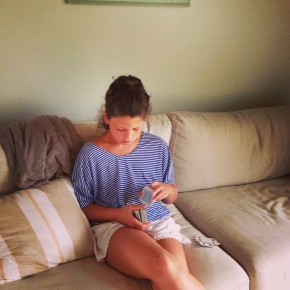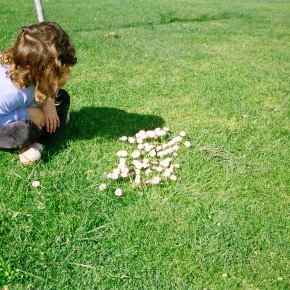 Maybe it’s because I’m such a chatterbox or I just love words, but I’m often asked how to encourage communication in children, particularly when they are preschool/primary school-aged.
Maybe it’s because I’m such a chatterbox or I just love words, but I’m often asked how to encourage communication in children, particularly when they are preschool/primary school-aged.
I believe that one of the greatest gifts a parent can give to their child is to listen to them. To really listen.
During the busyness of our lives, it’s all too easy to ask your child a question in passing but not truly listen to their answer. Or worse, we’ll answer the very question we’ve asked them, too impatient to wait for a response. If this happens often enough it can have the effect of making young children believe that their responses don’t really matter, so they may as well say nothing. They can become passive communicators not really engaging in everyday dialogue. So it’s important to set time aside each day to have a chat.
Try and craft your conversations to elicit as much information as you can from your child. Keep your questions engaging and open-ended. Pop in the occasional nonsensical word along with a new word to make them think and laugh. With very young children, ask them lots of questions about the world around them that can’t easily be answered with a yes or no.
 Fill their everyday world with wonder so they become eager to talk to you about it. And remember, wonder can be found in the simplest of places by little children. As you go about your everyday tasks, chat to them about the things you are seeing and doing together. The why of a thunderstorm, how a spider spins its web, who makes rainbows, why we use flour to bake a cake, how much mustard to add to a ham sandwich, why their puppy likes to chase cats etc, etc. For example, on a walk around the suburbs or in your garden, rather than ask a question such as “Do you like flowers?”, you might instead ask, “What is your favourite flower? ” Or, “Do you like a flower’s colour or smell best? Shall we try and find one?”
Fill their everyday world with wonder so they become eager to talk to you about it. And remember, wonder can be found in the simplest of places by little children. As you go about your everyday tasks, chat to them about the things you are seeing and doing together. The why of a thunderstorm, how a spider spins its web, who makes rainbows, why we use flour to bake a cake, how much mustard to add to a ham sandwich, why their puppy likes to chase cats etc, etc. For example, on a walk around the suburbs or in your garden, rather than ask a question such as “Do you like flowers?”, you might instead ask, “What is your favourite flower? ” Or, “Do you like a flower’s colour or smell best? Shall we try and find one?”
 During their tween and teen years, children can become monosyllabic (see my post from yesterday) so I’ve found this strategy really useful. Although (and this is VERY common), do expect that the majority of responses will take the form of a series of grunts and snorts (a language only understood by children aged 10-17). You’ll need to work hard to elicit conversation. Going on a long drive together (with no technology) can sometimes help, as there are no distractions. You essentially have them trapped for an hour or so. My son and I had the most extraordinary conversation about death and his belief of what God is on a recent road trip down south. His ideas were fascinating and really made me think. It’s still a battle to have him chat like he used to, but I persevere, knowing that this will return in force once puberty passes.
During their tween and teen years, children can become monosyllabic (see my post from yesterday) so I’ve found this strategy really useful. Although (and this is VERY common), do expect that the majority of responses will take the form of a series of grunts and snorts (a language only understood by children aged 10-17). You’ll need to work hard to elicit conversation. Going on a long drive together (with no technology) can sometimes help, as there are no distractions. You essentially have them trapped for an hour or so. My son and I had the most extraordinary conversation about death and his belief of what God is on a recent road trip down south. His ideas were fascinating and really made me think. It’s still a battle to have him chat like he used to, but I persevere, knowing that this will return in force once puberty passes.
There are some words I feel all children should automatically include in everyday language all the time. They are the obvious ones; Please and Thank You. Apart from it being polite to do so, it encourages them to think about being grateful for what they have and shows a basic respect for the person with whom they are communicating. If you are finding it tricky to elicit these words in your young children, think about setting up a simple reward chart. Once the children get to a certain number of “Ts and Ps” you can thank them yourself by applauding their efforts and giving them a little treat.
 Swearing for effect can be common in young children. They may well have no clue what the word actually means, rather they delight in the reaction saying it elicits. I have taken the approach that it is more important to teach children when to swear rather than try and knock it out of them completely. In so doing, the swear words lose any fascination they may have once held.
Swearing for effect can be common in young children. They may well have no clue what the word actually means, rather they delight in the reaction saying it elicits. I have taken the approach that it is more important to teach children when to swear rather than try and knock it out of them completely. In so doing, the swear words lose any fascination they may have once held.
In social settings, I’ve always encouraged my children to shake hands (I don’t think it’s fair to ask them to kiss or hug a stranger), say hello and look the recipient in the eye whilst doing so. I started asking them to do this from about the age of two. It’s important and builds their confidence and instils positive social skills. It also encourages them to have a further conversation with the person they’ve just met.
 This is relatively easy for confident children but for those who are shy or reserved (and particularly for those who are on the spectrum) it can be difficult and sometimes incredibly confronting. For those on the spectrum, their parents understand that their child may not have the skills to manage social occasions and will often give them time to respond to questions and importantly prepare them beforehand for the social setting into which they will be placed. If you meet a child such as this, respect the child’s space and be aware that some kids will always be more comfortable than others in unusual or new settings.
This is relatively easy for confident children but for those who are shy or reserved (and particularly for those who are on the spectrum) it can be difficult and sometimes incredibly confronting. For those on the spectrum, their parents understand that their child may not have the skills to manage social occasions and will often give them time to respond to questions and importantly prepare them beforehand for the social setting into which they will be placed. If you meet a child such as this, respect the child’s space and be aware that some kids will always be more comfortable than others in unusual or new settings.
 If you have a shy child, ask the people they are meeting to get down to their level, introduce themselves and ask a simple open-ended question such as “Hi. My name’s Caro. What is your name? What’s the best thing that’s happened to you today?” If they are too shy to respond, simply give them a smile and suggest that perhaps you can have a chat later.
If you have a shy child, ask the people they are meeting to get down to their level, introduce themselves and ask a simple open-ended question such as “Hi. My name’s Caro. What is your name? What’s the best thing that’s happened to you today?” If they are too shy to respond, simply give them a smile and suggest that perhaps you can have a chat later.
Above all, I encourage parents and carers to talk to their children all the time. To fill their everyday with chatter and discovery. Each day, add in new words and challenge them to think of their own new, fun words to use. Try and make the learning of new words and how to use them a fun, exciting daily family ritual. When my children were very little we used to play a game. The rules were simple. We would take it in turns to go through the alphabet citing a word, a name, an animal and a food that started with a particular letter. For example, A is for awesome, Annabel, antelope, apple and so on. Everyone hated it when we got to X and Z. Although my kids quickly learned the meaning of words such as xenophobia, xenon and xyst!
15 ideas to try to encourage chatter, develop dialogue and aid discovery
- Set aside at least half an hour each day to chat to your child.
- Give them time to respond to questions.
- Involve concepts such as colours, letters and numbers into your conversations.
- Have them read something to you each evening (age dependent).
- Always ask open-ended questions.
- Add quirky new words into their world every other day.
- Let them loose with a video camera and ask them to make a movie about themselves.
- Sing together, loudly.
- Make your own book together.
- Take long drives in the car ~ no technology allowed.
- Make up your own alphabet game.
- When they are old enough, encourage them to phone their friends simply for a chat.
- Remember that all children develop at a different pace and that you know your own child’s abilities best.
- Be quick to praise and slow to criticise.
- Teach them how to play cards.
Until next time…
This post originally appeared in another format on the great website called SuperSpeak. Check it out for other tips, advice and information on encouraging super communication in your children.
Leave a Reply